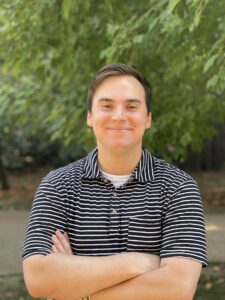 Alex Stoneman, senior Chemical and Biomolecular Engineering & Chemistry undergraduate student in the Lang lab
Alex Stoneman, senior Chemical and Biomolecular Engineering & Chemistry undergraduate student in the Lang lab
T-cells are key parts of the mammalian immune response, and T-cell receptors (TCRs) help them recognize their foreign targets. Previous lab work has shown that TCRs act as mechanosenors; piconewton-scale forces facilitate their extremely specific interactions with antigens. The lab uses optical tweezers to study these biological systems at the single-molecule and single-cell level. These instruments use tightly-focused lasers to trap and manipulate micron-sized beads on the nanometer scale, which can apply and measure extremely small forces.
One part of my research has focused on improving the throughput of the lab’s experimental assays, because calibrating optical tweezers can be a rather arduous process. I developed a self-complementary hairpin sequence that can be incorporated into DNA tethers used in optical tweezer experiments. This hairpin produces a characteristic “breaking” signature at a known amount of force—roughly 5 pN, well-suited for T-cell assays—giving an internal reference for force and distance within every optical tweezer trace.
I have also performed computational studies of the TCR’s force-dependent conformational change, which has been observed experimentally but remains poorly understood mechanistically. I have simulated pulling on the protein, both natively and with various structural modifications, in order to characterize this conformational change. Ultimately, this work will contribute to a better understanding of overall TCR functioning, which has major implications for potential treatments for a plethora of diseases, including diabetes, influenza, and cancer.
At Vanderbilt, outside of research, I teach science lessons to local middle schoolers through Vanderbilt Student Volunteers for Science and host prospective students through ‘Dore for a Day. I am also the Editor-in-Chief of the Vanderbilt Political Review.
VINSE has been instrumental in providing a collaborative community throughout my research experience at Vanderbilt. I have learned a great deal and received a wealth of support from VINSE members, which I appreciate immensely, and I hope to be able to pay it forward in future roles.